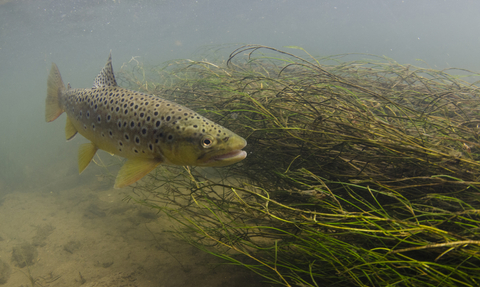
Brown trout, photo Jack Perks
Rivers of Life appeal
Can DWT's work with farmers and landowners help to address the climate and wildlife crises? Naturally
You’ve probably seen recent news reports that our rivers face threats from pollution. But Devon’s watercourses are under pressure in a variety of ways, with the problems faced by our rivers – and the wildlife that depends on them – more complicated than the current headlines.
Every day sees river pollution from chemical fertilizers, pesticides and slurry, with watercourses impacted by run-off from both soils and hard surfaces. But many landowners want to work with Devon Wildlife Trust to ensure their land management isn’t having negative effects on soil and watercourses – and to increase the diversity and abundance of wildlife on their farms, woods and waterways.
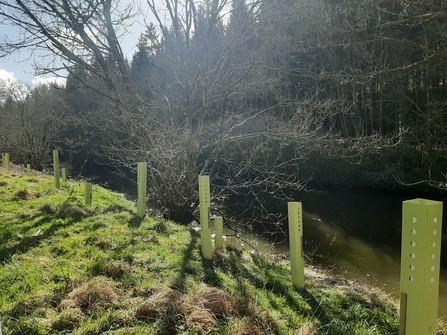
Trees have been planted to help maintain shade, reducing the impacts of warming on rivers and to replace trees lost from Ash Dieback.
DWT has been working for years to boost wildlife, improve water quality and reduce flooding in Devon’s rivers. And, with your support, we’ve seen great successes: thousands of trees planted on riverbanks to create wildlife habitat and reduce erosion; natural flood management interventions on the River Otter and reduced pollution from farmland on rivers from the Exe to the Dart.
But there is so much more that we need to do. People across Devon want to see the health of our rivers restored. So we are delighted to have secured part funding for a long-term project that will improve freshwater and farmland habitats for wildlife. The Northern Devon Natural Solutions project will operate in the Taw and Torridge river catchments, as well as on watercourses emptying into the sea off Exmoor and the coast around Hartland.
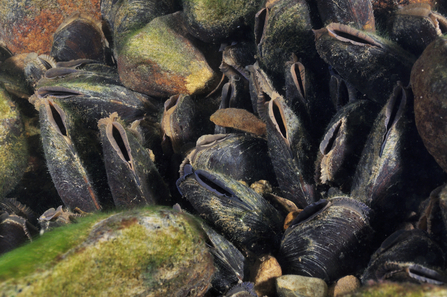
Freshwater pearl mussel. Photo, Linda Pitkin/2020VISION
DWT’s support and advice on managing land next to rivers and streams will benefit a wide range of wildlife, from orchids and butterflies on wet grasslands, to the declining populations of Atlantic salmon and endangered freshwater pearl mussels in northern Devon’s rivers.
But the funding available doesn’t cover the full cost of this essential work. Every year DWT needs to raise almost half the costs of this project – your donation will support efforts to improve 18,000 hectares (44,000 acres) of northern Devon’s farmed landscape for wildlife, over the next six years.
Rivers of Life appeal
Enhancing hedges to benefit the 2,000 plant and animal species that can thrive in a Devon hedge, reducing erosion of riverbanks, improving the ecological health of both soils and watercourses, creating new areas of woodland and wildflower-rich grassland, and supporting landowners who want to create wilder areas of land, all across a huge area of northern Devon – this new project will encourage farmers to think big and act naturally. Can you help us make a start with a donation today?
Rivers of Life appeal
Tackling the wildlife and climate crises? It's only natural
The problems
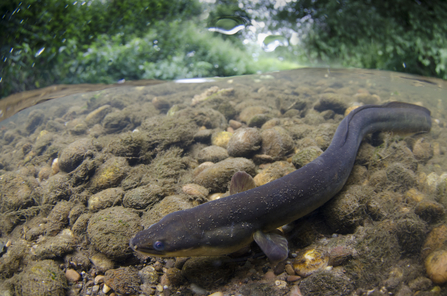
European eel, photo Jack Perks
Polluted rivers
Wildlife in Devon’s rivers is threatened by the impacts from some forms of farming. Where maize is grown close to waterways, rivers are clouded by soil washed off the land by heavy rainfall. Phosphates used in chemical fertilizers move from soil to rivers in the same way, causing the growth of algae in the water. Where grazing animals can access a riverbank this adds to soil erosion, meaning even more sediment ends up in the river. Around half of the places on the Torridge surveyed by the Environment Agency for salmon, trout and eels showed very low numbers of all three species, due to poor water quality.
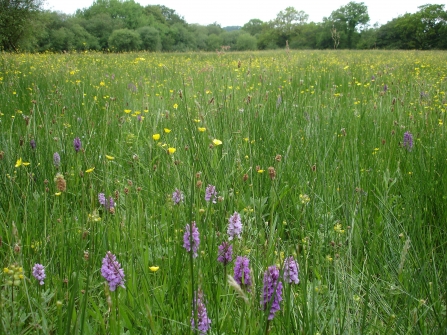
Increasing flood risk
Northern Devon’s traditional wet, rushy pastures – known as Culm grassland – are very effective in storing rainwater and releasing it slowly. But more than 90% of this habitat was lost in the 20th century with much of it drained as farming intensified. Many fields in northern Devon now don’t retain rainwater in the same way as they once did, so water rushes off the land into streams and rivers, increasing the risks of flooding downstream.
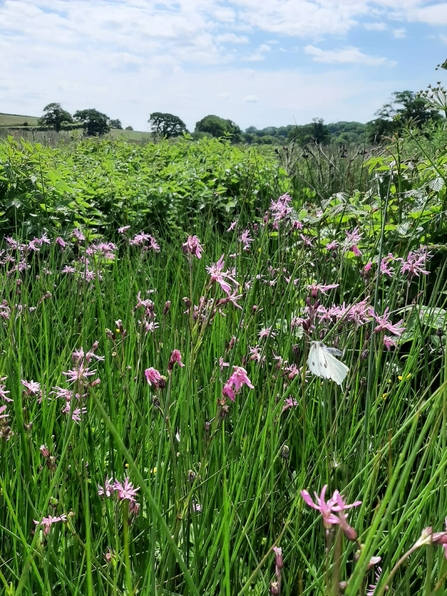
Ragged robin - a wetland wildflower species now thriving in a fen habitat on the Torridge floodplain.
Loss of wildlife
Those vanished Culm grasslands were also incredibly rich in wildflowers, supporting rare butterflies, moths and other insects, as well as providing food or shelter for an array of birds, reptiles and small mammals. That’s why DWT has worked with landowners for years to restore Culm grassland across northern Devon. Lost too will be the ash trees which feature on many Devon riverbanks, most of which are likely to be affected by ash dieback.
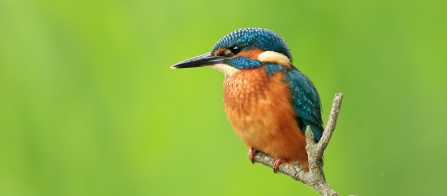
Kingfisher by Jon Hawkins, Surrey Hills Photography
Climate change
The higher temperatures and increased rainfall expected due to climate change will both further increase the risk of flooding and create additional pressure on wildlife. Where species need to move to find suitable habitat, they will need linked-up areas of land that are not hostile to wildlife. That means each farm and landholding has a role to play.
Our Natural Solutions
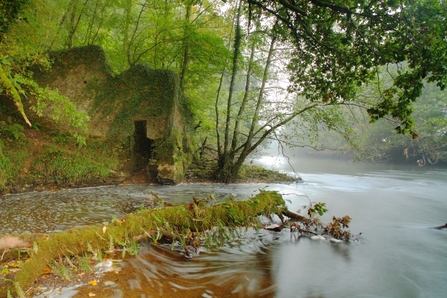
Kevin New
Protecting riverbanks
We can improve river health and increase the area of good wildlife habitat on riverbanks by planting trees, by installing fencing to keep cattle away from the river and by creating wildflower-rich grassland alongside waterways. In total 90km of riverbank habitat will be improved for wildlife during this project.
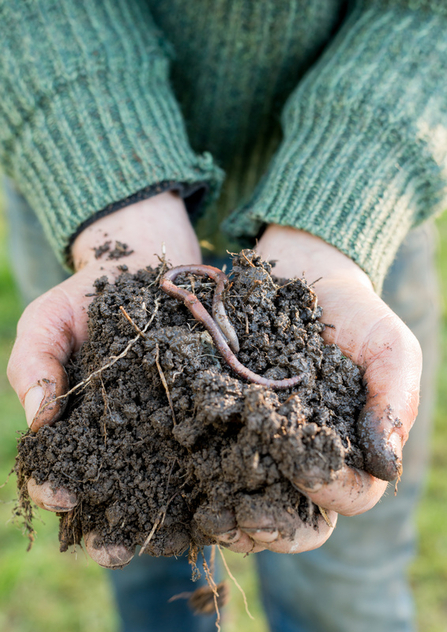
Photographyfirm, Shutterstock
Improving soil health
DWT Land Advisors have years of experience of working with farmers to ensure more soil stays on the land and doesn’t end up in rivers – and we can help landowners access equipment they need to ‘aerate’ soils to ensure they’re in better condition.
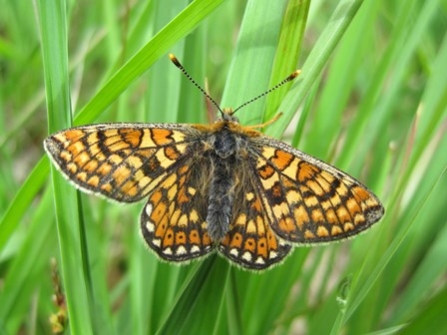
Marsh Fritillary. Photo, Mike Symes
Wetland habitat creation
Creating ponds and restoring wet grassland can improve water quality in nearby rivers and reduce flood risk, as well as ensuring better habitat for endangered wildlife including the marsh fritillary butterfly. The project aims to improve 915 hectares of existing natural features and create 180 hectares of new wildlife habitat.
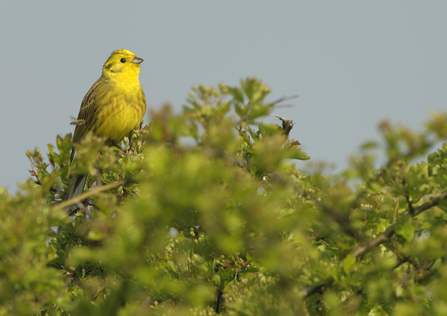
Photo credit, Chris Gomersall/2020VISION
Better management of hedges
A well-managed Devon hedge can support 2,000 species of animals and plants. But many Devon hedges are cut too frequently and too severely while some are neglected and ‘gappy’. Our work here in northern Devon will see at least 90kms of hedgerow in good management for wildlife.
'Wilding' the land
This project will work on 14 landholdings where landowners are happy to see natural processes return to the land, as natural regeneration of woodland creates a mosaic of carbon-storing tree cover and open grassland habitats that are home to many insects, birds and mammals
Rivers of Life appeal
Returning life to our rivers - where do we start?
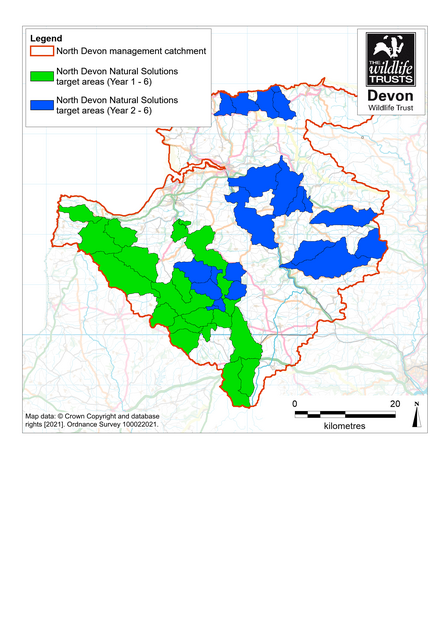
The Northern Devon Natural Solutions team are due to start soon. In the first year, work will begin on the West and East Okement rivers rising on Dartmoor, on other tributaries of the River Torridge, including the Lew and the Mere (which empties into the Torridge opposite DWT’s Halsdon nature reserve) as well as working on the Torridge itself. In addition, work will focus on the Abbey River, which flows into the sea near Hartland.
In around 12 months’ time, the project will expand to also begin work on the River Taw, along with tributaries such as the Mole, Bray and Little Dart. The team will also work on the Heddon River, on the edge of Exmoor.
